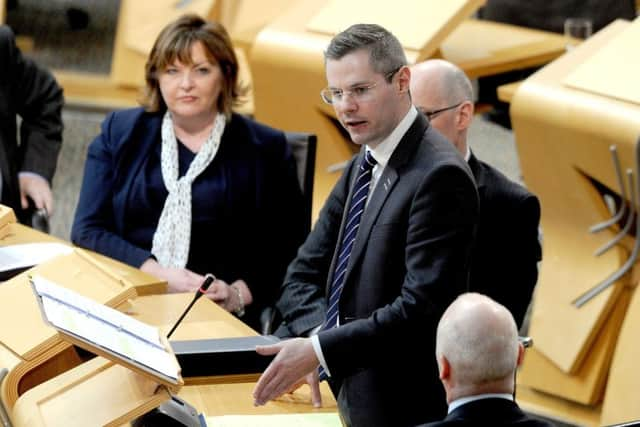Budget 2018: Tax divide between middle earners in Scotland and England
Philip Hammond has increased the personal allowance for all workers across the UK to £12,500.
But the Chancellor’s extension of the 20 pence basic rate to cover more workers will not apply to Scots.


Advertisement
Hide AdAdvertisement
Hide AdThe proposal to restrict the 40p higher rate south of the Border to salaries of £50,000 and above will be introduced next April, a year earlier than planned. It means all workers earning less than this will pay only the 20p rate.
In Scotland, workers start paying Holyrood’s new higher 41p rate on a significantly lower salary of £44,300 in the tax regime unveiled by the Scottish Government last year.
Tax chiefs are now warning that the Chancellor’s tax breaks could be “bad news” for Scotland’s finance secretary Derek Mackay, who will set out his own budget in December.
Moira Kelly, chairwoman of the Chartered Institute of Taxation’s Scottish technical committee, said it showed the “practical difficulties” of having control over certain aspects of the tax regime.
“Because the Scottish Government has no control over the level at which the personal allowance is set, it means that thousands of people who paid Scottish income tax this year will be taken out of the income tax system altogether, resulting in a loss of revenues that would otherwise have gone directly to Holyrood,” Ms Kelly said.
“With a median income of £24,000 per year in Scotland and only 2.5 million taxpayers, losing tax contributions from several thousand individuals can have a significant impact on the Scottish budget.”
The Scottish Government has control over rates and bands and unveiled an overhaul of the system last year. It created five bands, including a 46p top rate for those earning more than £150,000 and a 41p higher rate for those on £44,200 to £150,000. It also includes a 19p starter rate for salaries up to £13,850, a 20p basic rate from £13,850 to £24,000 and an intermediate rate of 21p from £24,000 to £44,200.
It meant just over half of Scots saw their taxes fall marginally, while just under half at the higher end of the earning scale faced heftier rises, which increased the more they earned. Overall, the changes raised £164 million more in tax than under the previous UK-wide system.
Advertisement
Hide AdAdvertisement
Hide AdMs Kerr added: “It is unlikely that they will follow the UK government’s lead in increasing the higher rate threshold to £50,000 from next April, highlighting a growing gulf between Scottish and English taxpayers.
“For those who are able to – such as self-employed business owners – this is likely to increase attractiveness of reorganising their tax arrangements to opt out of Scottish income tax and into UK-wide corporation tax in order to reduce their liabilities.”
The changes unveiled yesterday mean a police inspector in Scotland earning £48,200 will pay £1,183 more in tax than an officer of similar rank elsewhere in the UK. A headteacher on £45,111 will pay £533 more, while a GP on £56,500 will pay £1,625 more.
Laura Mair, EY’s head of tax in Scotland, said: “By bringing forward the increase to the threshold for higher rate taxpayers in England, Wales and Northern Ireland, the Chancellor has widened the gap between the amount of tax paid by some higher earners in Scotland versus their equivalents in the rest of the UK.
“It looks likely those who earn around £50,000 in Scotland might be out of pocket by the equivalent of the annual energy bill of the average Scottish household following these changes.”
Scottish Conservative deputy leader Jackson Carlaw said: “The ball is now in Derek Mackay’s court. With tax cuts being delivered south of the Border, the case for yet more SNP tax rises next year in Scotland is simply unsustainable.
“Nicola Sturgeon must rule it out now.”
